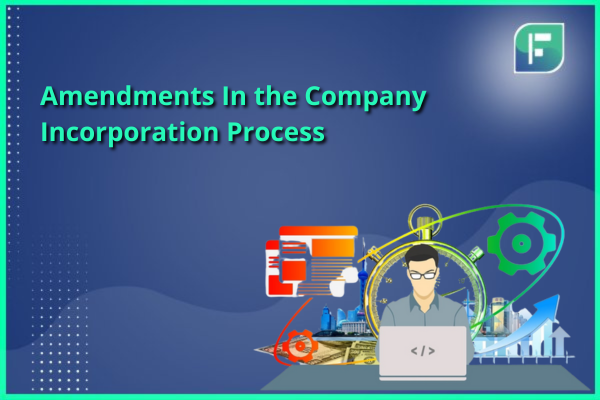The Companies (Incorporation) Amendment Rules, 2023, issued by India’s Ministry of Corporate Affairs (MCA) on January 23, 2023, made substantial revisions. This comprehensive change aims to simplify the processes of company formation and structural conversion. One of the crucial improvements requires the nominee’s name to be included in the memorandum of the One Person Company (OPC). This blog delves into the significant amendments in the Company Incorporation Process.
What is the Company Incorporation Process
The legal process of forming a new corporation so that it becomes a separate legal entity from its owners (shareholders or members) is known as company incorporation. This method requires multiple steps and legal requirements using the company registration.
- Select a Business Name:
Choose a creative and available name for your business. This name should adhere to your jurisdiction’s naming rules and regulations, which may include limits on specific words or phrases.
- Appoint a registered or statutory agent:
To receive legal documents and notices on the Company Incorporation Process’s behalf. The registered agent’s address is usually the same as the company’s official address.
- Fees for Filing:
Pay the necessary filing fees for registering your company entity. The fees can vary significantly based on your jurisdiction and business structure.
- Conform to Duty obligations:
Comprehend and follow the duty obligations connected with your business structure. This might incorporate filings for government, state, and city charges.
- Pursue State Duties:
You might be expected to enlist for state deals, finance charge, or other state-explicit expenses, contingent upon your area and company activities.
- Notices (if required):
Some states may require you to issue a notice of the creation of your firm in a local newspaper. Check your jurisdiction’s regulations to discover if this is required.
- Maintain continuous Compliance:
Following incorporation, you must comply with constant compliance standards such as filing yearly reports, holding frequent meetings, and keeping accurate records.
Inclusion of Nominee for OPC Ownership
The change mandates that the candidate’s name for a One Person Company (OPC) owner be included in the OPC’s memorandum. This phase stresses transparency and protects the rights of stakeholders in the event of unforeseen circumstances for the Company Incorporation Process. Form No will provide the nominee’s information and consent as a declaration. INC-32 (SPICe+), along with the applicable fee, as described in the Companies (Registration Offices and Fees) Rules, 2014. This is consistent with the government’s goal of improving accountability and corporate governance.
Revisions to Various Forms for Company Incorporation Process.
The Companies (Incorporation) Amendment Rules also include adjustments to a variety of forms, including the INC-3 One Person Company-Nominee Consent Form, the INC-14 Declaration, the INC-15 Declaration, and the RD-GNL-5 Form for filing a supplement to correct flaws or incompleteness omitted. Furthermore, changes have been made to a variety of forms, including RUN, INC-4, INC-6, INC-9, INC-12, INC-13, INC-18, INC-20, INC-20A, INC-22, INC-23, INC-24, INC-27, INC-28, INC-31, SPICE+ (INC-32), INC-33, INC-34, INC-35, and RD-1. These changes show the government’s commitment to improving and aligning systems with modern business needs.
Simplification of Conversion Processes
The Companies (Incorporation) Amendment Rules, 2023, have simplified specific OPC conversion processes. Rule 6, which governs the conversion of an OPC into a public or private company, has been revised to reduce the number of attachments required for this process. This simplification streamlines compliance while encouraging firms to pursue structural modifications that meet their changing needs better.
Enhancing Creditor Consent and Transparency
The modification makes an essential change in Rule 7, which handles the conversion of a private corporation into an OPC. The updated rule now requires all creditors to provide No Objection Certificates (NOCs) and the appropriate papers. This preemptive approach guarantees that creditors have no complaints or outstanding dues during the conversion process, increasing openness and avoiding potential conflicts.
Section 8 Companies and Their Application Process
The Companies (Incorporation) Amendment Rules, 2023, also address charitable organisations functioning under Section 8 of the Companies Act for the Company Incorporation Process. Rule 19 currently includes modifications to the application process for new charity corporations. Specific improvements will likely have been made to shorten the licence application process, increase transparency, and incorporate adjustments based on shifting legal and regulatory frameworks.
Conversion Guidelines for Section 8 Companies
Rules 20, 21, and 22 guide numerous instances concerning Section 8 company conversion. Section 8 licence application process is outlined in Rule 20 for established enterprises. Rule 21 describes the conditions and standards for converting a Section 8 business to any other type of corporation. Rule 22 further outlines additional restrictions that Section 8 corporations must follow when migrating to different company kinds. These principles form a defined foundation for assuring easy and legal conversions.
Efficient Registered Office Address Shifting
Rules 28 and 30 address transferring a company’s registered office within the same state and across state borders. Rule 28 defines the methods and requirements for changing the registered office within the same condition. In contrast, Rule 30 outlines the identical procedures for changing the registered office across states or union territories. When changing a company’s registered office address, these guidelines assure compliance with legal and regulatory norms.
Conclusion
The Companies (Incorporation) Amendment Rules, 2023, demonstrate the government’s commitment to modernising the Company Incorporation Process. Including nominee data for OPCs, improvements to various forms, streamlined conversion processes, improved creditor permission, and structured guidelines for Section 8 businesses all contribute to a more transparent, accountable, and efficient corporate ecosystem. These modifications give a more precise roadmap for formation, conversion, and compliance within the legal framework as enterprises adjust to changing conditions.






